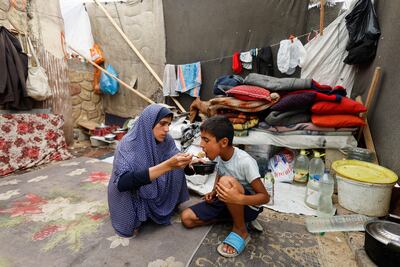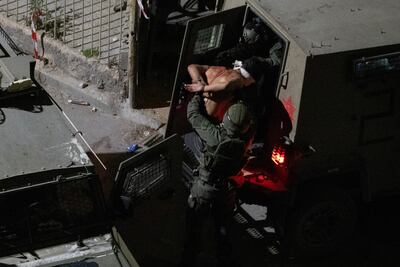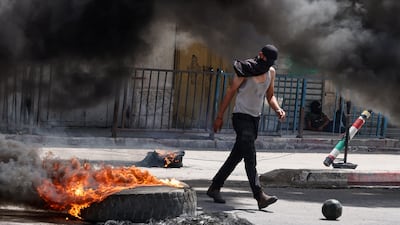Live updates: Follow the latest on Israel-Gaza
Israel intensified its bombardment across the Gaza Strip just after midnight on Thursday, killing dozens of Palestinians, as its forces advanced deeper into the heart of the southern city of Rafah.
The assault on Rafah, a city that served as a refuge for more than half of Gaza's 2.3 million people, has sent hundreds of thousands of people fleeing to previously war-ravaged areas of the enclave since May 6.
Palestinian media reported that an Israeli air strike on Gaza city killed at least 16 people, including 10 children. In a separate strike, seven people in one house were killed in Zawayda. Eight Palestinians, including children, were killed in the Nuseirat refugee camp.
Reuters reported that Israeli tanks had taken up position on the edge of Yibna neighbourhood in central Rafah, raising concern that a full-scale invasion of the southern city was imminent despite international concerns about high civilian casualties.
Residents said the area near Yibna had experienced intense shelling as warplanes and helicopters hovered above.
Israel says it has to enter Rafah to flush out the Hamas fighters it believes are hiding there.
US Secretary of State Antony Blinken told a House of Representatives hearing on Wednesday that the Biden administration is concerned about Israel's possible use of heavy bombs against civilians in Rafah.
“We have an ongoing conversation with Israel about this and about our concerns about the use of these particular weapons in that particular way in that particular place. And those concerns remain,” Mr Blinken said.
US Secretary of Defence Lloyd Austin said on X that he discussed the importance of protecting civilians in Rafah in a phone call with Israeli Defence Minister Yoav Gallant.
More than 35,700 Palestinians have been killed, according to the Health Ministry, since Israel started its war on Gaza on October 7 in retaliation to a Hamas attack which killed about 1,200 Israelis.
The UN estimates that more than 800,000 people have fled Rafah since Israel launched its offensive there.
The Israeli army said it had found rocket launchers aimed at Israel in eastern Rafah. Residents said that the Israeli military was still stationed in the area.
The military added that it was advancing through the Brazil and Shaboura neighbourhoods based on information on “terror targets” it said it had received. It also conducted raids in Beit Hanoun in northern Gaza, claiming to be fighting Hamas remnants.
The military said it killed a number of Hamas fighters in Khan Younis, including a key member identified as Ahmed Yasser Alkara. Israeli forces returned to the city, which lies north of Rafah, despite the military claiming to have defeated the group there months ago.
Khan Younis, already devastated by the previous Israeli offensive, is one of the cities where Palestinians displaced from Rafah are seeking refuge.
“With the ongoing waves of displacement from Rafah to destroyed areas, the situation is worsening, especially in the western regions of Khan Younis, which lack essential services and facilities for the displaced,” Inas Hamdan, acting public information officer for the UNRWA in Gaza, told The National on Thursday.
“Although these areas are said to be safe, in reality, they are not safe.”
The heavy fighting, constant displacement and lack of essential items such as food, water and fuel are worsening an already dire humanitarian crisis across the Gaza Strip. There is concern that the heat of summer could make the situation worse.

Mohammed Hussein, who left his home in eastern Rafah when the Israeli incursion began, now lives in a tent in Khan Younis with nine family members. He says the heat inside and the lack of water were making it unbearable.
“I can handle the shortage of food and the lack of water, but what about the children? All I care about is providing them with food and good living conditions,” he said.
Aid delivery, which has been slow because of Israeli restrictions and a hostile security environment, dropped sharply after Israel's seizure of the Gaza side of Rafah crossing from Egypt prompted its closure.
“I haven’t received aid for a month, and we are now eating from the stored food we received before. The amount we have is nearly finished,” Umm Saleh Abu Armana, 45, who is living with eight family members in a classroom at an UNRWA-run school in Tal Al Sultan, west of Rafah city, told The National.
“The Israeli army mentioned that the west of Rafah would be a safe place. They want us to survive the shelling only to die from hunger.
“I hope we can go back to our normal life. Diseases are spreading here and the living conditions are terrible.”
World Food Programme spokesman Steve Taravella told AP on Wednesday that they handed out a “limited number” of high-energy biscuits in central Gaza. This was from the first batch of relief brought in through the US-built pier on Gaza's coast this week.
US National Security Adviser Jake Sullivan said that some of the aid had been delivered “specifically to the Palestinians who need it”.
Israeli raids in West Bank
As the offensive in Gaza intensified, the death toll from the Israeli raid on the Jenin refugee camp in the West Bank rose after a 30-year-old Palestinian man died from his wounds on Thursday morning.
At least 12 people have been killed in the operation that began on Tuesday morning, including four children and a doctor, the officials Palestinian news agency Wafa reported.
Ambulances were prevented from providing medical assistance to those shot by Israeli forces and a paramedic was arrested while treating the injured, Wafa said.
Market stalls, vehicles and civilian property were destroyed by Israeli bulldozers during the raid, local media reported.
Al Jazeera said Israeli forces fired at their crew near a hotel in Jenin on Wednesday night as they were preparing to go live. One hotel staff member was injured.

Footage from the raid shows smoke billowing from tyres set on fire by Palestinian protesters clashing with Israeli forces. Most of the streets near the Jenin refugee camp were empty of civilians.
Videos on social media showed Israeli forces with snipers and military bulldozers on the streets, with roundabouts and civilian property in Jenin turned into rubble. Footage also showed blindfolded men stripped to their underwear before being taken away.
More than 18 Palestinians were arrested since Wednesday evening in Ramallah, Nablus, Hebron and Jericho. This raises the overall number of arrests since October 7 to 8,840, according to Wafa.
The Jenin camp has been a target of repeated Israeli military operations, particularly since October 7. The Israeli government claims the camp is a stronghold of armed factions responsible for committing and plotting attacks.


